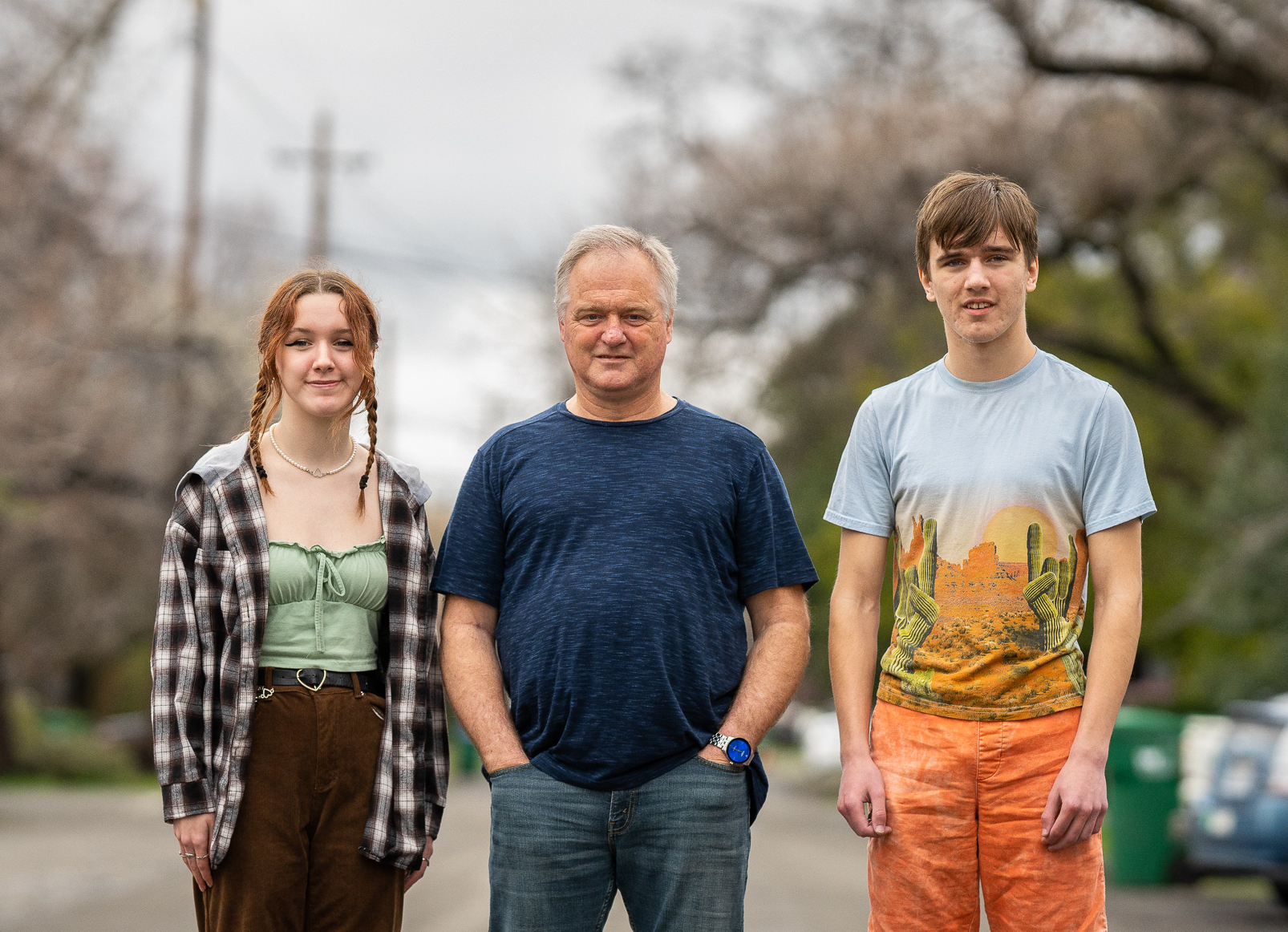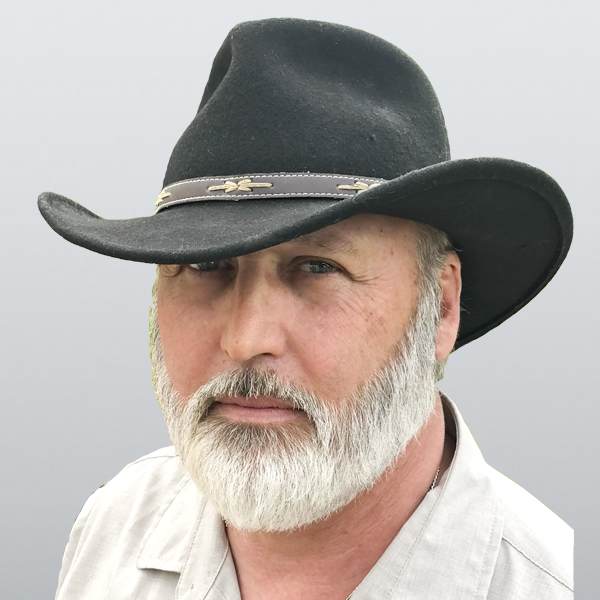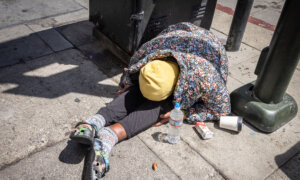CHICO, Calif.—Ten years ago, Brett Boman could have never imagined himself as a drug addict living on the streets and eating from dumpsters, but that was before his 13-year-old son was struck down by a vehicle at a crosswalk in Paradise, Calif., and killed.
As he drove to the store to pick up groceries, Boman had passed Skyler, who loved to run and was out for a jog along his usual route, about a half-hour earlier.
It was the last day of school, May 31, 2013, and Skyler had plans to stay at his friend’s house that evening.
But he never arrived.
Skyler’s skull was severely fractured in the accident. He was declared brain dead and taken off life support about a week before his 14th birthday.
Boman was stricken with grief and blamed the driver for taking Skyler’s life.
A middle-aged widower and single father, Boman was a skilled cabinet maker and finish carpenter working hard to support his three children. Skyler was the eldest, then Yvonne and Brett Jr., affectionately nicknamed “Vonnie” and “Junior.”
Before the tragedy, Boman would occasionally have “a drink or two,” he said. But after losing Skyler, he began to imbibe more—and more often—until he found himself drinking a fifth of vodka or whiskey every day or two and smoking marijuana to mask his pain.
His life was slowly unraveling, and when an acquaintance introduced him to methamphetamines, he spun out of control into a downward spiral.
“One night, I started using meth,” he said. “I carried a lot of hate and anger with me, and it eventually ate me up. That’s what got me using to kind of get away from it.”
He was living in a motel suite in Chico, Calif., with his children, but before long, he lost his job, fell behind on rent, and was evicted.
“We were living in a freakin’ motel. That’s where I ended up because I didn’t work for a few years,” he said. “I was just doing enough to get by. We were struggling.”
His addiction got worse, and by November 2016, Boman was living in his truck with Vonnie and Junior.
“My kids and I were on the street for about a week, and then the police showed up and took them,” he said.
Child Protective Services placed the children in foster care.
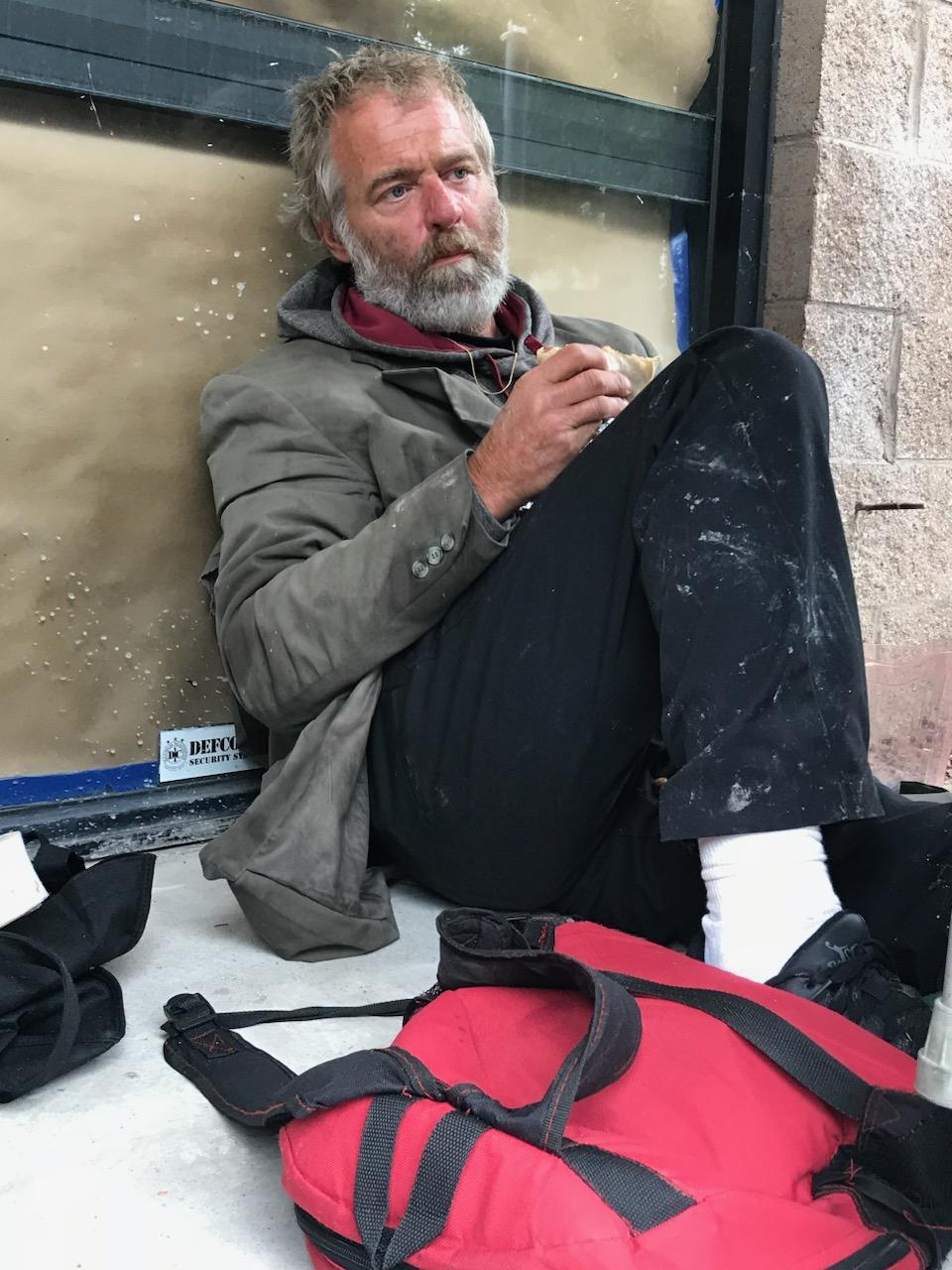
Brett Boman, a former homeless meth addict, lived on the streets of Chico, Calif., for nearly two years before he got into a Salvation Army rehabilitation program. (Courtesy Brett Boman)
For a few more weeks, Boman lived alone in his truck, until he lost it too.
He stayed on the streets for nearly two years.
He would sometimes snort meth, but usually smoked about 25 hits of meth a day or more in his glass pipe if he had enough funds and could find a dealer.
Many of the homeless addicts in Chico at the time stayed in sprawling encampments and sustained their drug habits mainly by shoplifting, Boman said.
On one occasion, a worker at a retail store left a plastic bag at a bus stop containing an electronic security deactivation device to stop store alarms. The device, he recalls, was a hot commodity among addicts, and he sold it for about $65, he said.
But eventually, he grew weary of being hassled by police, being arrested “as kind of a forced time out,” and losing his shopping cart, the accumulation of his homeless life full of “whatever I had stolen” or “got out of a dumpster,” he said.
He got tired of the harsh weather, hunger, and sleeping on the ground and was overwhelmed with guilt for abandoning his other two children. He wanted to get off the street.
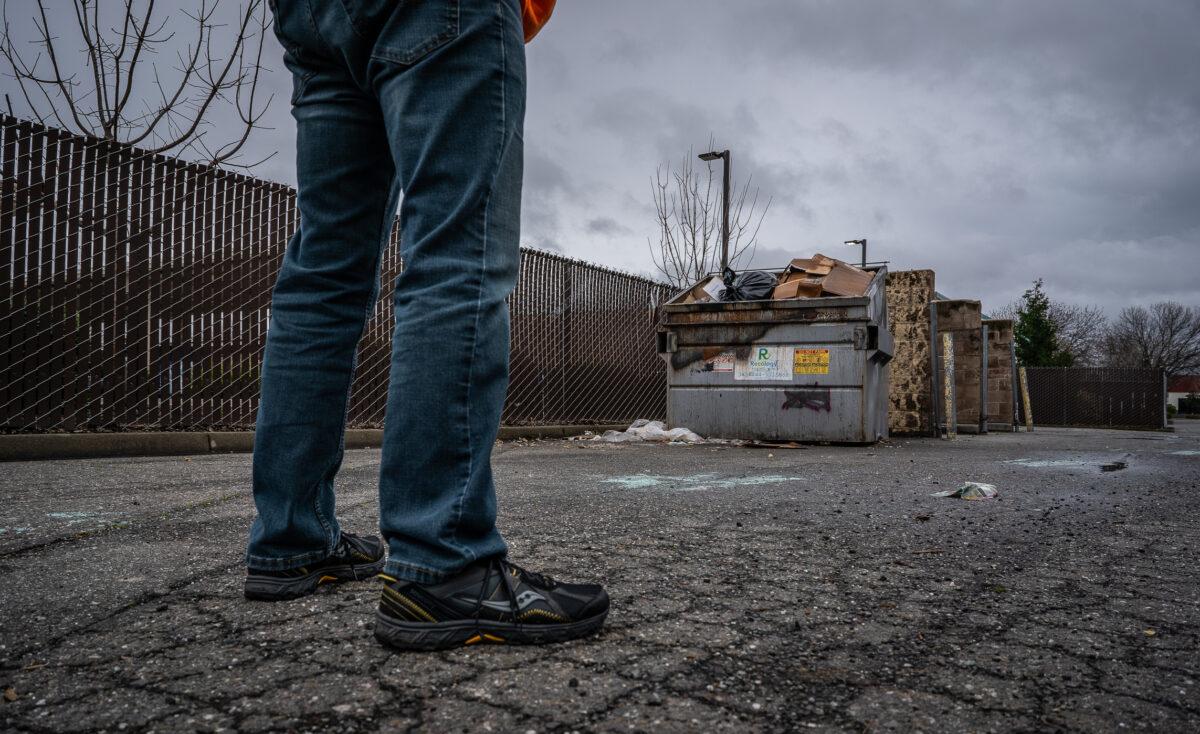
Brett Boman looks at a dumpster he used to eat out of while homeless and on drugs in Chico, Calif., on March 12, 2023. (John Fredricks/The Epoch Times)
Homeless Shelter
“I cleaned up. I got myself into the homeless shelter here where they do random drug tests. I was able to get clean for about three months,” Boman said. “But the problem with the shelter is you go there at five o’clock, you spend the night and at six o’clock in the morning, they kick you back out on the street. So, you’re back out on the street, still around the same people, and eventually I started getting high again and got kicked out.”
A friend who had gone to The Salvation Army and had done well in recovery would check in on Boman “once in a while” and encourage him to get help.
“The problem with that is you’ve got to be able to pass a drug test to get in,” Boman said. “They don’t want detoxing inside, so you’ve got to be able to get clean for a week and pass the test.”
Boman said he would stay clean for a couple of days, but then relapse.
“I kept trying. I’d go a couple of days, and then, of course, you’re weak,” he said.
He finally got himself into the Salvation Army in Chico and began to take responsibility for his actions.
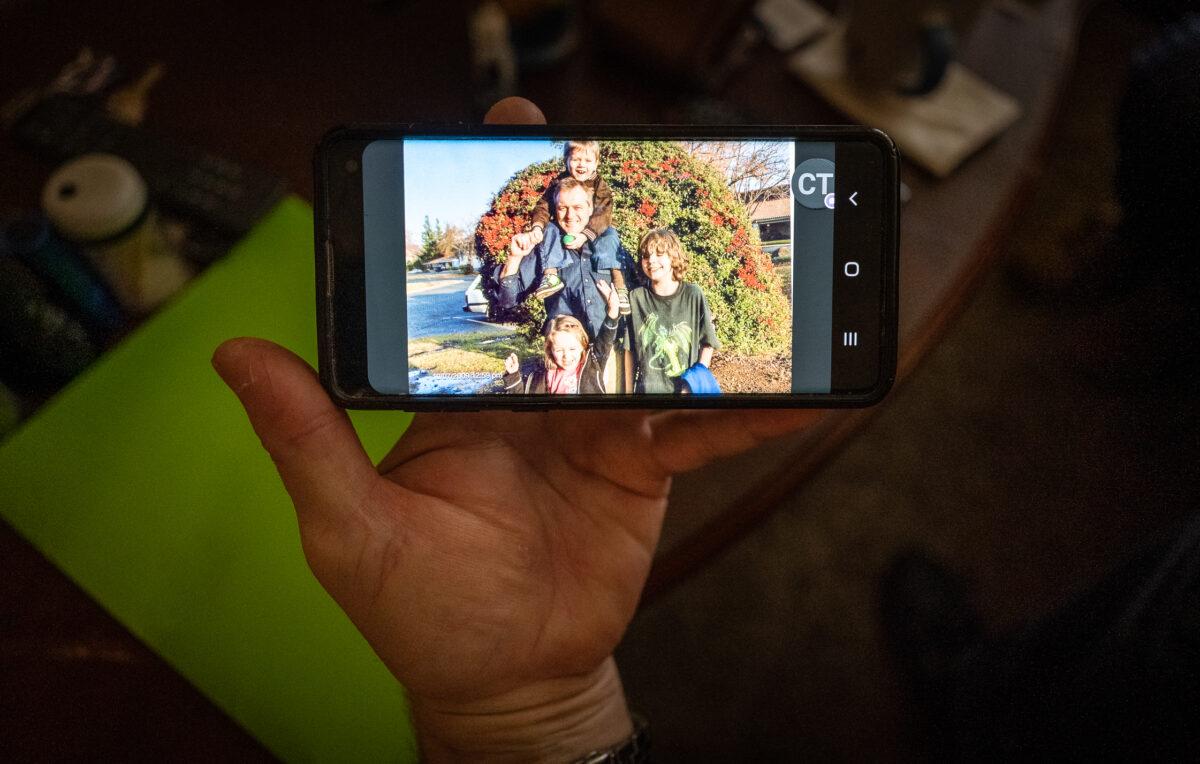
Brett Bowman looks at a photo of his children including his deceased son, Skyler, in Chico, Calif., on March 12, 2023. (John Fredricks/The Epoch Times)
Mom to the Rescue
“I called my mom, and I said, ‘Mom, I just need a place to get clean so I can get into The Salvation Army,’” Boman said. “I wasn’t supposed to be around my kids because I was using. My mom came and picked me up. I stayed at her place for four days until I could pass a test.”
His friend had talked to the program coordinator at The Salvation Army, and she had a bed ready for him.
“My mom took me down there. I passed my drug test, and they let me in,” Boman said.
The withdrawals were bad, but not as severe as opioids, he said.
“Meth isn’t like heroin or fentanyl,” he said. “You have your cravings and, trust me, there were times when I wanted to freakin’ head out and go find some, but I just had to stay strong through it.”
Boman kept reminding himself that his children were more important than getting high.
“That was my carrot,” he said.
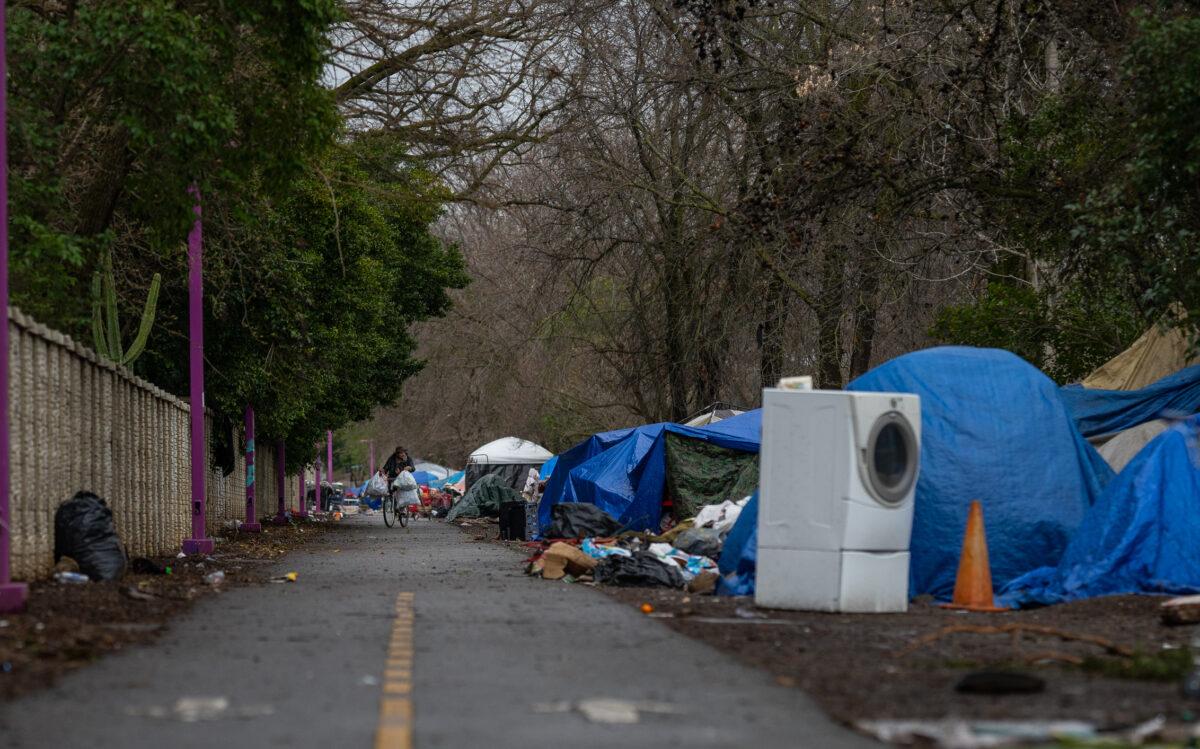
A homeless encampment in Chico, Calif., on March 12, 2023. (John Fredricks/The Epoch Times)
Finding Forgiveness
Boman participated in work therapy, counseling, classes, and a 12-step program over the next six months at The Salvation Army’s live-in facility in Chico.
“I was willing to leave everything behind, put my family to the side for a little while and just focus on myself, deal with the sponsor, deal with the issues—my anger, frustration with everything that had gone on in life that I was blaming everything else for—and find my own accountability, and accept that I played a role in almost everything that went bad,” he said.
Boman said he was lucky enough to meet a “hard-edged guy” who led weekly Alcoholics Anonymous meetings. He disliked him at first, but by the third week, he said, something clicked.
The man, who would later become his sponsor, had lost his son to a drunk driver.
“I kind of went, ‘OK I get it,’” Boman said.
“One of the things he wanted me to do was write a letter to the guy that hit and killed my son to work through my anger,” he said.
When Boman finished the letter, his sponsor, said it was “perfect” and asked if he could share it with other AA groups.
“And, what it came down to for me to release all that, was accepting that it wasn’t God or anybody doing it to make me suffer, and that it wasn’t done intentionally. It was an accident,” Boman said.
“I forgive the guy who killed my son. I hold no vested anger towards him at all anymore. I feel bad for him because he’s got to live with it. He did not set out that day to kill my son. I just had to come to terms and accept the fact I don’t hate the guy anymore. He didn’t do it on purpose.”
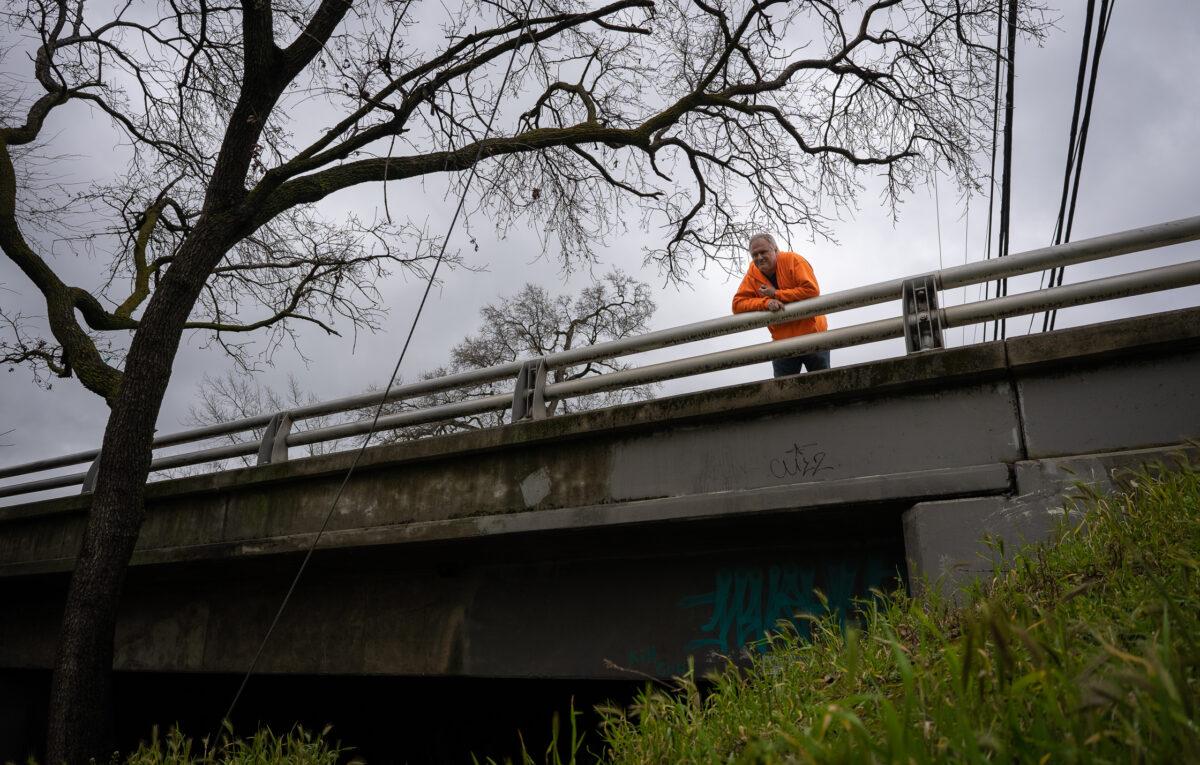
Brett Boman stands over a bridge he used to sleep under while homeless in Chico, Calif., on March 12, 2023. (John Fredricks/The Epoch Times)
Spiritual Life
In March 2023, Boman revisited his homeless hangouts: A dumpster behind a pizza joint from which he ate, an encampment of wind-torn tents and ramshackle shelters where hundreds of homeless lived, and a spot near a bridge along Lindo Channel where he slept in the long grass and brush below.
Boman stopped at The Salvation Army where he received a warm welcome from friends and staff. Sitting in the chapel, he said: “This is where I found my faith—inside this room.”
Growing up, Boman had a tight-knit family and a religious upbringing.
“My grandfather was a Pentecostal preacher. I grew up in the House of the Lord. He had his church here in Chico, over behind the cemetery, so I grew up in faith, going to Sunday school,” he said.
Over the years, Boman began to doubt his faith and had trouble reconciling science and religion, and there were times when he cursed God for his struggle and strife, he said.
“So, obviously, I believe. I’m working through that,” he said. “I am a spiritual person. There is something out there.”
Re-Entry Program
When he graduated, Child Protective Services would not allow Boman to stay at his mother’s place with his children until more time had passed and he had proven he could stand on his own as a responsible father.
He had a choice: Leave the Salvation Army and go back to the streets or ask to be admitted to the Salvation Army’s re-entry program where he continued classes and counseling but was allowed time to look for a job.
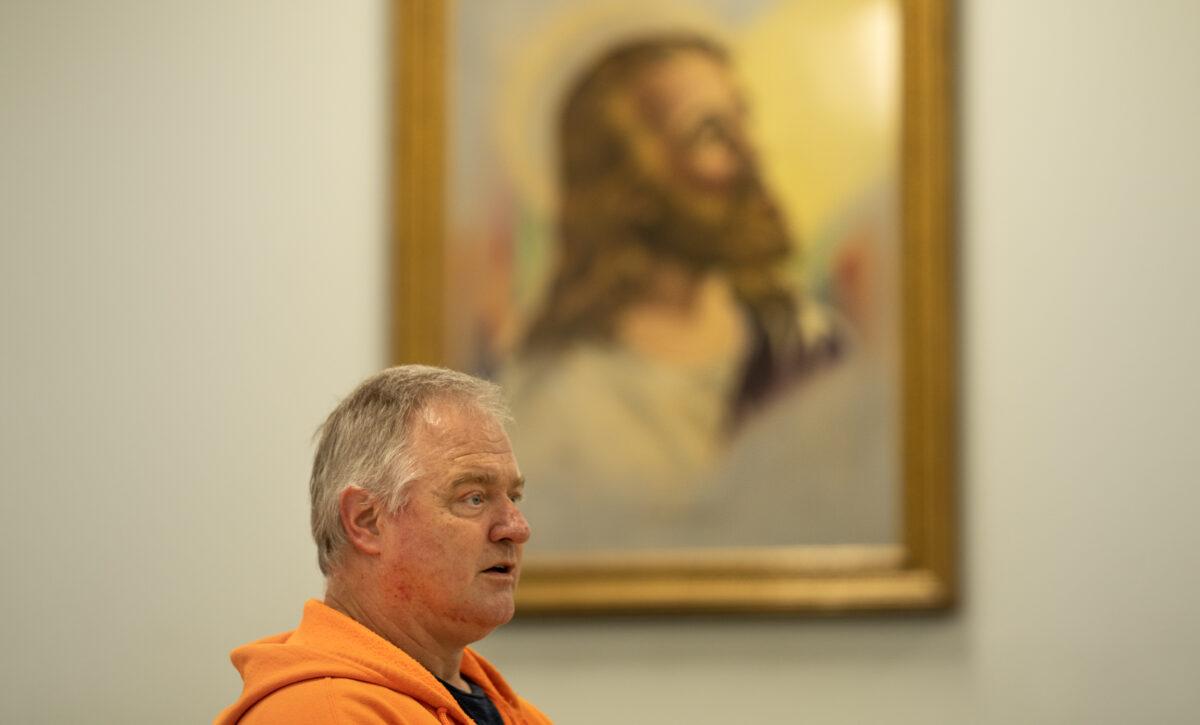
Brett Boman sits under a painting of Jesus in the Salvation Army chapel where he was able to recover from drug addiction in Chico, Calif., on March 12, 2023. (John Fredricks/The Epoch Times)
“I had to work in the warehouse only two days a week. That gave me three days a week to get out and find a job,” he said.
As an experienced carpenter, Boman lined up a job with a local contractor who was building houses. He worked hard and saved money until he graduated from his second six-month program on Oct. 10, 2019.
He and a friend who was also about to graduate from the re-entry program started looking for a place to rent and eventually became roommates.
Boman remembers calling a prospective landlord who asked if Boman could pass a credit check, so Boman gave him a “quick spiel” about his life and said he wasn’t looking for handout, just someone who would give him a break, he said.
When the landlord called the program coordinator at The Salvation Army, she urged him to “give these guys a chance,” Boman said.
“He let us move in,” he said. “We just had to pay double deposit.”
His roommate moved out a few years ago, but Boman stayed in the house where he now lives with his children. He has been clean and sober for six years.
Brett Jr.’s Story
Brett Jr., who was six years old when Skyler died, said his brother’s death hit him hard because they were close.
“We used to play games all the time,” he said. “When I was told that he was gone, that he wasn’t coming back, I remember crying ... but I didn’t really understand,” he said. “It’s not something I still cry about. With everything we’ve been through, something I’ve gotten very good at is getting over stuff, but I do sometimes think that it would be a lot better if he was still alive.”
He remembers when his father started to go downhill.
“He seemed to care more about his weed and stuff more than he cared about us,” he said. “It became a big part of him.”
When his father “forgot to pay the rent,” they had to stay at his grandma’s house, Brett Jr. said.
“I remember them arguing quite a bit because my dad wasn’t in the greatest place, and she didn’t like that. She wanted him to be better than that,” he said.
He remembers living in different foster homes and that it was difficult for him to adjust.
“I was still so upset at my dad for everything that we had gone through. For the longest time, until he got out of Salvation Army, I blamed him for everything in my life—everything that went wrong,” Brett Jr. said. “When one of his children died, then he just stopped caring about the other two. That’s the way I felt for years—I was so mad.”
When social workers asked if he wanted to live with his father again, he wasn’t ready.
“It was nice to see him and all, but I didn’t want to live with him,” Brett Jr. said. “I was scared of going through the same stuff.”
When he was about 12, Brett Jr. and Vonnie moved into their grandmother’s home in Paradise.
“That’s when we saw him a few times, which we weren’t technically supposed to do, but we went down and saw him down here in Chico where he was staying on the streets with a bunch of other people,” he said. “We kept going down there, and then our grandma went down on her own to talk to him. She was trying to get him to go into The Salvation Army, and after she had gone down there a couple times to convince him, he actually decided to go.”
“It was only after he finally decided to fix his life that I actually decided to give him a second chance, because I started to miss him,” Brett Jr. said.
Vonnie’s Story
Vonnie also had a close bond with her older brother, and because Skyler died on the last day of school, time stood still that whole summer, she recalled.
“It was really tough,” she said, “We didn’t have anything to distract ourselves. When I wouldn’t see him ... it just made me feel really bad.”
She remembers going to her father, sobbing, and seeing the devastating impact the tragedy was having on him. He began to drink and smoke marijuana and slept a lot during the day, she said.
“For a long time, he was physically there, but he was emotionally absent,” she said.
Eventually, friends and family, including their grandmother, stepped in to care for her and Brett Jr., but it felt like they had lost not only their brother but their father too, she said.
In November 2018, the Camp Fire in Paradise—the deadliest wildfire in California’s history—killed 85 people.
At the time, Vonnie and Brett Jr. were living in Paradise with their grandmother. Vonnie was about seven miles away in Chico where she was bused to school when the town was engulfed in the inferno, but her grandmother and Junior were at the house in Paradise.
“I knew they were trying to get out,” she said.
But she was afraid they wouldn’t make it out in time to escape the fire. She felt helpless, especially with her father still in recovery at The Salvation Army.
Having already lost her mom and one brother, the fear of losing anyone else was unbearable and struck deep.
Her grandmother’s home in Paradise burned and her family lost everything, but she’s grateful her grandmother and Junior made it out safely.
“I lost things that belonged to my brother ... and my mom’s jewelry and stuff,” she said. “We lost our four dogs.”
Reuniting With Family
As Boman began to make amends and reunite with his family, the road to forgiveness was rough, with both children experiencing mixed emotions, torn between love for their father and resentment over what he had done.
“At first, I just wanted to forgive him. I was like, ‘I just want my dad,’ but I hadn’t fully processed everything that happened,” Vonnie said. “Junior wanted him back in our lives. He missed him, but I was really upset, because I was like, ‘Why did you do this to me?’ but deep down, I missed him.”
When her father finally entered The Salvation Army, “that made me feel a lot better, especially ... because he wanted to be back in our lives,” Vonnie said.
“A lot of people who are on the streets wouldn’t really do that for their kids. I’ve had friends who’ve also had parents like that,” she said. “I’m happy that he went there and got better. I’ve definitely seen a big improvement from how he was before. Obviously, he’s sober. It’s been pretty nice.”
When she passes the homeless encampment and hangouts “where I know my dad used to sleep sometimes ... it does kind of feel weird,” she said. “I’m just glad that he’s gotten better. I told him I’d give him one more chance after everything he’d done, and he has so far been pretty good with that chance. He’s been doing a lot better and taking responsibility.”
Her father, she said, has worked hard to earn back her trust, love, and respect, and her relationship with him feels much more “like the way things used to be” before her older brother passed away.
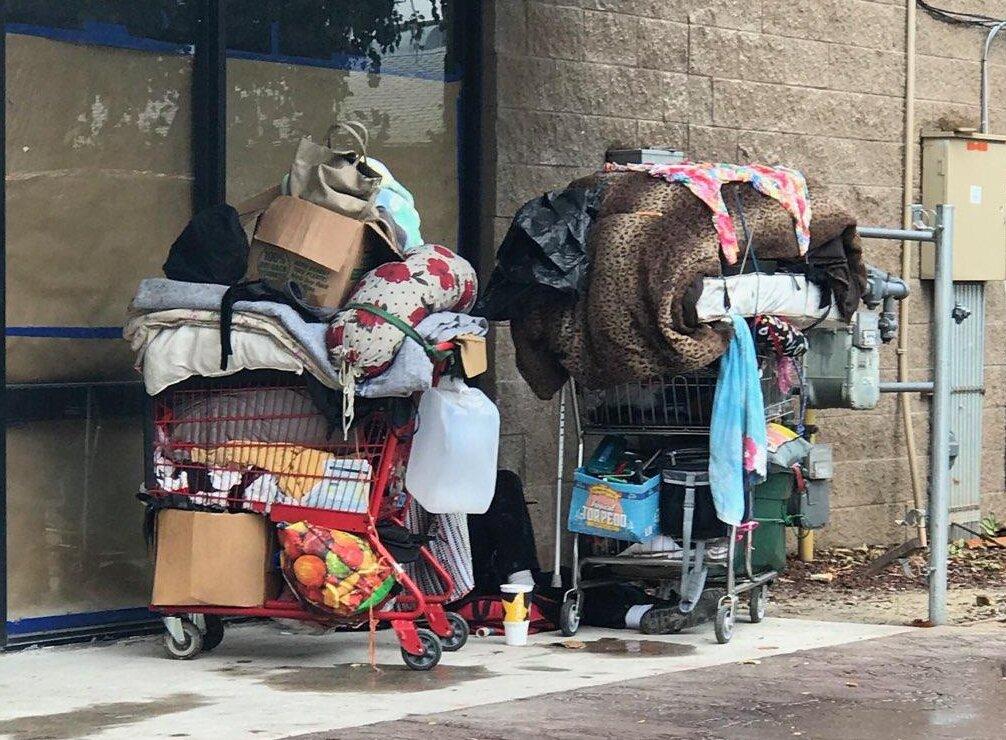
Shopping carts containing all Brett Boman’s belongings when he was homeless. (Courtesy of Brett Boman)
Insight Into Homelessness
Boman’s time on the street has given him insight into the lives of homeless people and why they’re homeless. A small percentage, he says, are there because of a catastrophic life event, such as job loss, eviction, or loss of a partner. Those are the easiest people to help and the most likely to pick themselves back up, he said.
Then there are those with mental health issues—most of them on drugs and self-medicating—who are harder to help. Most of these people don’t make any attempt to get help for their mental health, because getting high is easier, he said.
“These people need help, but nowadays they can’t be forced into treatment,” Boman said.
But the largest group of people are on the street by choice—choosing to keep using drugs instead of being responsible.
At the time, Boman fit into all three categories. He suffered a catastrophic life event, was masking mental health issues related to the loss of his son, and was doing drugs by choice.
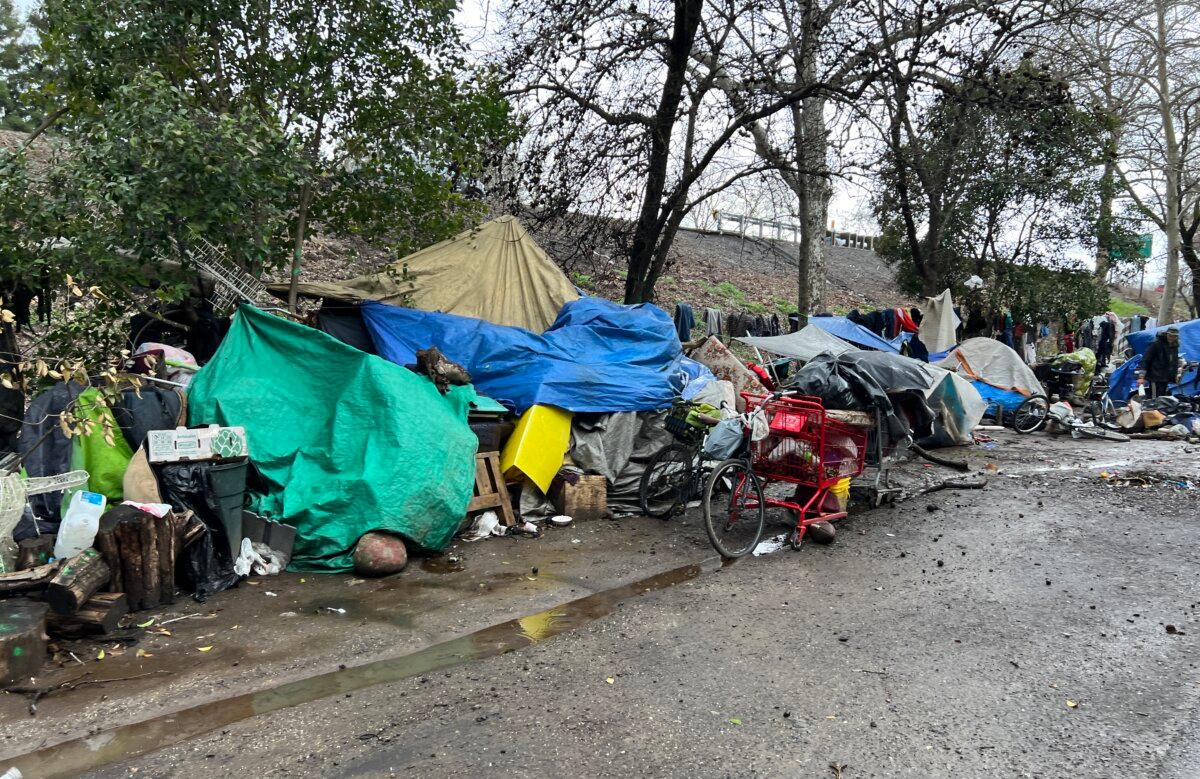
A homeless encampment in Chico, Calif., on March 12, 2023. (Brad Jones/The Epoch Times)
Homeless Encampments
In January 2023, Boman testified at a state Senate Public Safety Committee hearing in support of proposed legislation intended to compassionately clear
homeless encampments by requiring a 72-hour warning before an encampment sweep, but the bill died in committee.
Senate Bill 31, introduced by Sen. Brian Jones (R-San Diego), would have also required law enforcement officers to provide information to the homeless about shelters and mental health services available in the area and prohibit homeless encampments near schools, parks, libraries, and daycare centers to protect children.
Boman, an advocate for the homeless, has testified at other legislative hearings since then.
In June, the United States Supreme Court issued a ruling that allows local governments to enforce laws related to illegal encampments and homelessness, and California Gov. Gavin Newsom issued an executive order in July directing state departments and agencies to start clearing unsafe encampments.
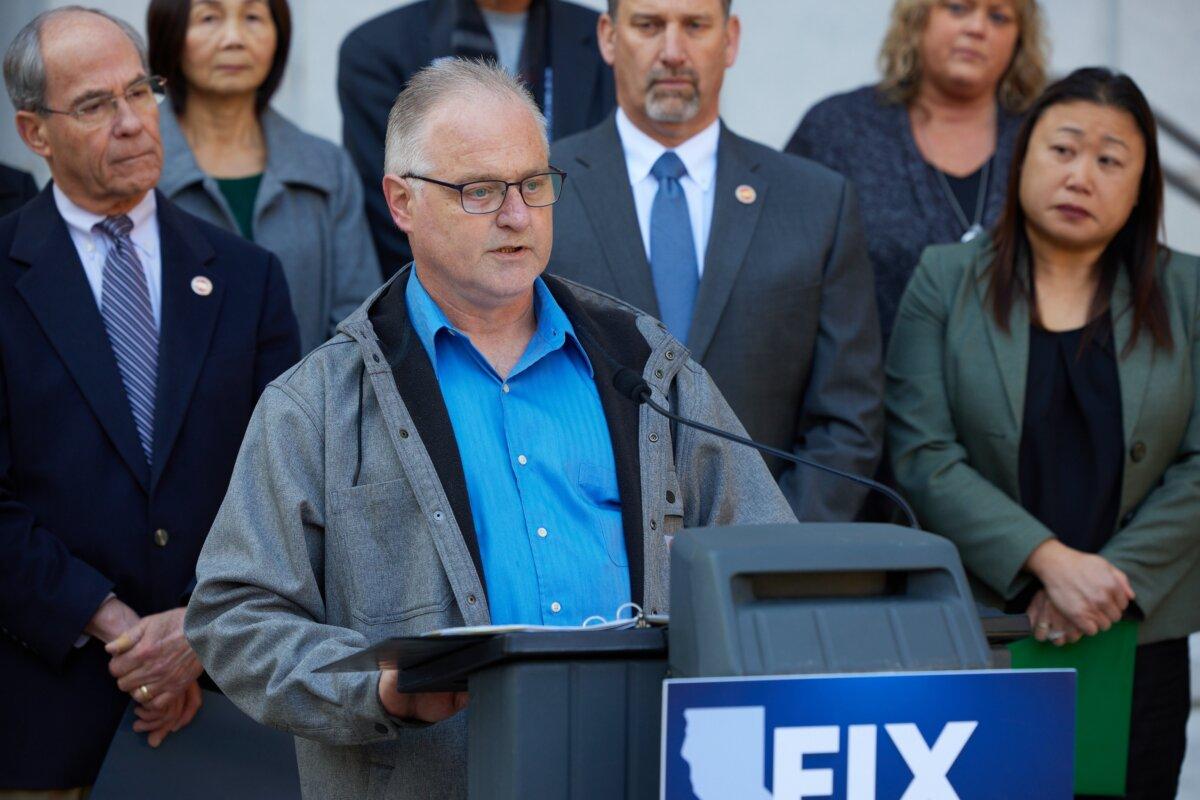
Brett Boman, an advocate for the homeless, speaks at a press conference at the state Capitol Building in Sacramento, Calif., on Jan. 24, 2023. (Courtesy California Senate Republican Caucus)
A Second Chance
Though Bowman feels blessed to have been given a second chance, he said many homeless addicts living in the encampments have lost all hope.
“You could offer them everything in the world ... to get clean and they’re not going to do it,” at least not without more deterrents and consequences, he said.
The first step to getting help—detox—is often “the most difficult to get,” he said.
More drug detox facilities where addicts can get clean before entering live-in rehab programs, like those run by The Salvation Army, are needed, instead of turning them away and expecting them to get and stay clean while they’re still living in a homeless shelter or on the street, he said.
The Salvation Army has one of the best success rates, especially for those who “stick around for another six months” and complete re-entry programs, Boman said.
Drug Crisis Worsens
About the time, Boman got into treatment, fentanyl—a powerful synthetic opioid—had become more common, and more people he knew on the street were dying from
overdoses. But the drug crisis has become even worse with
xylazine—an animal tranquilizer known as “tranq” that is often mixed with opioids, he said.
“Now they’re mixing tranq with fentanyl and heroin, and Narcan does not work with that stuff,” Boman said.
Authorities still recommend using Narcan to save lives, because it’s likely the person overdosing has fentanyl or other opioids in their system even if they also took other drugs.
Hope and Happiness
Today, with the help of The Salvation Army, Boman, now 55, realizes he should have sought mental health counseling to deal with his grief, instead of using drugs to numb the pain and anger he felt over losing his son that day in May more than a decade ago.
“I’ve been able to move forward since that day,” he said. “I’ll shed a tear every now and then, but now I can talk about it, and I don’t get broken up.”
He has also re-embraced his passion for music and playing guitar, as well as pride in his work as a skilled and talented carpenter.
“Life is great. I’m the most responsible I’ve ever been,” he said. “I’ve got a savings account. I have money in my checking, I have money in my savings, and I’ve got a credit card. These are things I really never had before. I lived paycheck to paycheck my whole life.”
Vonnie, 20, has finished two years of community college and is doing really well in university, and Brett Jr. is now in community college, he said.
“My son is doing better in school now that he is with me,” Boman said.
“I’m a happy man,” he said. “I’m hoping to continue to make everything better for me and my kids.”









